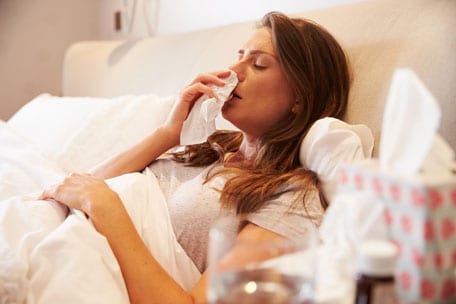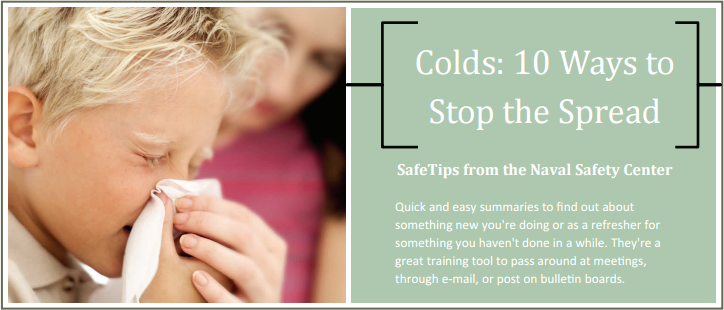Influenza - Safety
Influenza Season
| Note: This guidance was created for employees of the Naval Postgraduate School (NPS) and their families for the flu season. If you are not with NPS, then please seek guidance from your local safety office about where you can get the flu vaccine. |
Local Flu Vaccine Information:
UPDATE 12/6/2019 - Unfortunately, we cannot offer to the civilian employees at this time for the NPS Flu Drive: 10 and 11 DEC from 1100-1300 at NPS Gym/MBAC Basketball Court. We will only have enough vaccines for the Service Members.
UPDATE 11/14/2019 - We have important updates in regard to the originally planned November 19-20 NPS Flu Shot Drive. We received word from Presidio of Monterey Army Health Clinic that their shipment of vaccines has been delayed. Because of this, they will be re-scheduling the NPS flu drive for 10-11 DEC from 1100-1300 (location TBD).
The below dates are the planned events but they are liable to change depending on availablity of supply. This page will be updated as new information becomes available.
Flu drive dates:
Retiree Event (Commissary- 1100-1300)- Fluad (>65 years) 100 doses available
NPS Flu Drive: 10 and 11 DEC from 1100-1300 at NPS Gym/MBAC Basketball Court
Tricare Beneficiaries (ages 6 months and older) Flu Drive: 9 and 13 DEC from 1300-1600 at MG William H. Gourley VA-DoD Outpatient Clinic; 201 9th St., Marina, CA; lower level (Circle Drive entrance between lab and optical shop)- see and circulate attached flier.
As we wait for our vaccines, Service Members and their families may go out into the economy to get them earlier. Service Members must submit their documentation through their chain of command to ensure it reaches each Service’s respected tracking system (i.e. MEDPROS, ASIMS, MRRS). Please see these fliers for more information:
- CAL MED List of local Tricare Accepting Pharmacies that are administering Flu Vaccines
- CHOMP Free Flu Vaccinations Drive Flier for Nov 6th Event
- 2019 List of Monterey County No-Cost Flu Vaccination Clinics
How do I know if I have the flu?
You may have the flu if you have some or all of these symptoms:
- fever*
- cough
- sore throat
- runny or stuffy nose
- body aches
- headache
- chills
- fatigue
- sometimes diarrhea and vomiting
*It’s important to note that not everyone with flu will have a fever.
What should I do if I get sick?

Most people with the flu have mild illness and do not need medical care or antiviral drugs. If you get sick with flu symptoms, in most cases, you should stay home and avoid contact with other people except to get medical care.
If, however, you have symptoms of flu and are in a high risk group, or are very sick or worried about your illness, contact your health care provider (doctor, physician assistant, etc.).
Certain people are at high risk of serious flu-related complications (including young children, people 65 and older, pregnant women and people with certain medical conditions). This is true both for seasonal flu and novel flu virus infections. (For a full list of people at high risk of flu-related complications, see People at High Risk of Developing Flu–Related Complications). If you are in a high risk group and develop flu symptoms, it’s best for you to contact your doctor early in your illness. Remind them about your high risk status for flu. CDC recommends that people at high risk for complications should get antiviral treatment as early as possible, because benefit is greatest if treatment is started within 2 days after illness onset.
Do I need to go the emergency room if I am only a little sick?
No. The emergency room should be used for people who are very sick. You should not go to the emergency room if you are only mildly ill.
If you have the emergency warning signs of flu sickness, you should go to the emergency room. If you get sick with flu symptoms and are at high risk of flu complications or you are concerned about your illness, call your health care provider for advice. If you go to the emergency room and you are not sick with the flu, you may catch it from people who do have it.
What are the emergency warning signs of flu sickness?
In children:
- Fast breathing or trouble breathing
- Bluish skin color
- Not drinking enough fluids
- Not waking up or not interacting
- Being so irritable that the child does not want to be held
- Flu-like symptoms improve but then return with fever and worse cough
- Fever with a rash
In addition to the signs above, get medical help right away for any infant who has any of these signs:
- Being unable to eat
- Has trouble breathing
- Has no tears when crying
- Significantly fewer wet diapers than normal
In adults
- Difficulty breathing or shortness of breath
- Pain or pressure in the chest or abdomen
- Sudden dizziness
- Confusion
- Severe or persistent vomiting
- Flu-like symptoms that improve but then return with fever and worse cough
Are there medicines to treat the flu?
Yes. There are drugs your doctor may prescribe for treating the flu called “antivirals.” These drugs can make you better faster and may also prevent serious complications. See Treatment – Antiviral Drugs for more information.
How long should I stay home if I’m sick?
CDC recommends that you stay home for at least 24 hours after your fever is gone except to get medical care or other necessities. Your fever should be gone without the use of a fever-reducing medicine, such as Tylenol®. You should stay home from work, school, travel, shopping, social events, and public gatherings.
What should I do while I’m sick?
Stay away from others as much as possible to keep from infecting them. If you must leave home, for example to get medical care, wear a facemask if you have one, or cover coughs and sneezes with a tissue. Wash your hands often to keep from spreading flu to others.


